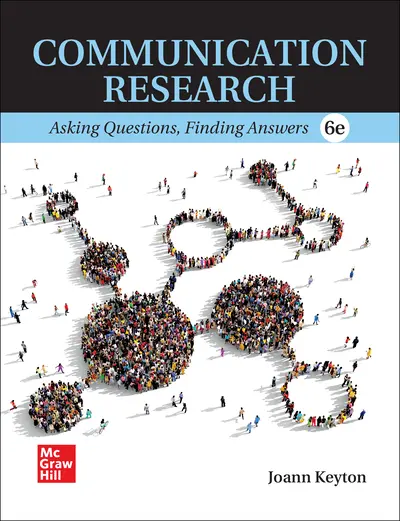My Account Details

ISBN10: 1266143726 | ISBN13: 9781266143724

Communication Research: Asking Questions, Finding Answers
Product not yet available for student view. Change to an older release to view student options.
-
Lowest Price!
-
-
McGraw Hill eBook
Textbook Rental (150 Days Access)
- Rent for a fraction of the printed textbook price
- Complete text bound in hardcover or softcover
Loose-Leaf Purchase
- Unbound loose-leaf version of full text
- Discount loose-leaf available within Connect
Shipping Options
- Standard
- Next-day air
- 2nd-day air
Orders within the United States are shipped via FedEx or UPS Ground. For shipments to locations outside of the U.S., only standard shipping is available. All shipping options assume the product is available and that processing an order takes 24 to 48 hours prior to shipping.
Note: Connect can only be used if assigned by your instructor.
Connect (180 Days Access)
- Digital access to a comprehensive online learning platform
- Includes homework, study tools, eBook, and adaptive assignments
- Download the free ReadAnywhere app to access the eBook offline
- Check with your instructor to see if a discounted loose-leaf version is available for purchase within Connect for an additional charge.
McGraw Hill eBook
Details:
- Normally the lowest price option for student
- Integrates in your LMS
- Accessible tools for students, including read-aloud functionality, jump links and dynamic note-taking and highlighting features
Textbook Rental (150 Days Access)
Details:
- Rentable option
- Hardcopy and softcover formats
Loose-Leaf Purchase
Details:
- Unbound loose-leaf version of full text
Connect (180 Days Access)
Details:
- Integrates in your LMS
- Prebuilt courses, presentation slides and instructor resources
- Test question banks, adaptive assignments, essay prompts, video content and more interactive exercises specific to your course subject
- eBook access (with included ReadAnywhere app)
- Print book add-on availability
- Remote proctoring
* The estimated amount of time this product will be on the market is based on a number of factors, including faculty input to instructional design and the prior revision cycle and updates to academic research-which typically results in a revision cycle ranging from every two to four years for this product. Pricing subject to change at any time.
Communication Research: Asking Questions, Finding Answers covers basic research issues and processes, both quantitative and qualitative, appropriate for communication students with little or no previous research methods experience. The text's guiding principle is that methodological choices are made from one's research questions or hypotheses. This avoids the pitfall in which students learn one methodology or one methodological skill and then force that method to answer all types of questions. Instead of working with one methodology to answer all types of questions, students come away understanding a variety of methods and how to apply them appropriately.
SECTION 1: RESEARCH BASICS
CHAPTER 1 Introduction to Communication Research
CHAPTER 2 The Research Process: Getting Started
CHAPTER 3 Research Ethics
SECTION 2: QUANTITATIVE COMMUNICATION RESEARCH
CHAPTER 4 Introduction to Quantitative Research
CHAPTER 5 Measurement
CHAPTER 6 Populations, Samples, and Sample Size
CHAPTER 7 Quantitative Research Designs
CHAPTER 8 Surveys and Questionnaires
CHAPTER 9 Descriptive Statistics, Significance Levels, and Hypothesis Testing
CHAPTER 10 Testing for Differences
CHAPTER 11 Testing for Relationships
CHAPTER 12 Quantitative Analysis of Text
CHAPTER 13 Reading and Writing the Quantitative Research Report
SECTION 3: QUALITATIVE COMMUNICATION RESEARCH
CHAPTER 14 Introduction to Qualitative Research
CHAPTER 15 Designing Qualitative Research
CHAPTER 16 Qualitative Methods of Data Collection
CHAPTER 17 Analyzing Qualitative Data
CHAPTER 18 Reading and Writing the Qualitative Research Report
Glossary
G-1 References
R-1 Name Index
I-1 Subject Index
I-9
About the Author
Joann Keyton
Joann Keyton (B.A., Western Michigan University; M.A., Ph.D., The Ohio State University) is Distinguished Professor Emerita of Communication at North Carolina State University. She specializes in group communication and organizational communication. Her current research examines the collaborative processes and relational aspects of interdisciplinary teams, participants’ use of language in team meetings, the multiplicity of cultures in organizations, and how messages are manipulated in sexual harassment. Her research is field focused and she was honored with the 2011 Gerald Phillips Award for Distinguished Applied Communication Scholarship by the National Communication Association. Her research has been published in Business Communication Quarterly, Communication Studies, Communication Monographs, Communication Theory, Communication Yearbook, Journal of Applied Communication Research, Journal of Business Communication, Management Communication Quarterly, Small Group Research, Southern Communication Journal, and numerous edited collections including the Emerald Handbook of Group Communication Theory and Research and the Handbook of Organizational Communication. In addition to publications in scholarly journals and edited collections, she published three textbooks for courses in group communication, research methods, and organizational culture in addition to co-editing an organizational communication case book. Keyton was editor of the Journal of Applied Communication Research, Volumes 31–33, editor of Small Group Research, Volumes 38-52, and founding editor of Communication Currents, Volumes 1–5. Keyton was founder and vice-chair of the Interdisciplinary Network for Group Research. For more information, contact Joann at joannkeyton@gmail.com or visit www.joannkeyton.com.
Need support? We're here to help - Get real-world support and resources every step of the way.
